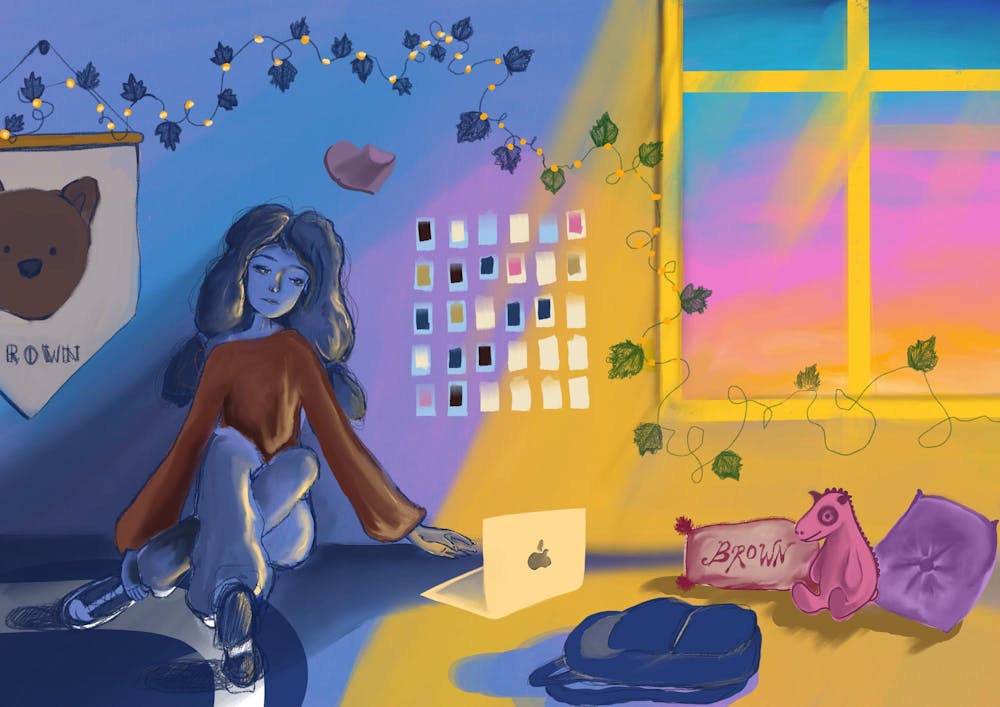At the beginning, it was good. It was exciting to be around so many new people, so many of them interesting, passionate, and unfailingly kind. Campus was beautiful, the sun casting its golden glow on the old brick buildings, the grass bright and wet, the ancient towering trees scattering shadows like mosaic tiles. I had uprooted myself, like so many of us do, to attend this institution, carrying with me the boundless optimism that comes with a fresh start.
To some extent, I had anticipated the difficulties—by nature, I am introverted, reserved, a little quiet. From my whole life spent in the same suburbs, I only had a few very close friends. But in the weeks prior to move-in, my family and friends told me, over and over again: Everyone is away from home and starting anew; everyone will be having a hard time; everyone is looking for new friends. It will be okay.
I tried, I really did. At the start of orientation week I participated in events with a near-vicious determination, rapid-firing introductions, sitting with strangers in the dining halls, plastering a constant expression of amiability on my face. For the first few nights, I attended the socials the university organized, hoping to meet people with whom I would really connect. But the socials turned out to be events completely without structure: We were tossed into a sea of fellow freshmen on the Main Green and left to fend for ourselves. Faces flipped before me like flashcards, their features hardly distinguishable in the dark, my mouth learning the same sequence of words—namefromdormmajor, every exchange ending as abruptly as it had begun. At the end of those nights I sat in my dorm alone, exhausted from the effort of being around so many people, troubled with the suspicion that nothing would come of all this work—the introductions and faces so easily shifting back to strangers, sliding away.
How did I make friends in the past? I’d grown so used to my friendships back home; they were ships with hulls worn so smooth with age that all signs of construction had been erased. We grew up together. Our parents all knew each other. Now, my muscles were atrophied; it was a Sisyphean task to start from scratch and rebuild.
Whatever dreams I had of bonding with my orientation group quickly dissolved. It became clear that the group of twenty-or-so people organized for the sole purpose of facilitating first-year socializing was going to do no such thing. We met for sessions that felt like class. Without the mandated icebreakers through which we learned each other's names—but not much else—we would have spent the meetings in complete silence. As the week dragged on, fewer and fewer people showed up.
I was always there. Because what else did I have to do? I had nobody I could readily text to make plans with, at least nobody yet—wasn’t that the whole point of orientation? Yet it seemed like everyone else was making friends fast: Large groups congregated on the green, eating together, walking together with such purpose, charging forward to some mysterious shared destination. How did they make it look so easy? What was I doing wrong that meant I did most things alone, that when I sat outside to read or write I would be the only one by myself?
Two blocks west of my dorm lies Prospect Terrace, a park in the shape of a small rectangle perched on a hilltop, overlooking the city below. I came there nearly every day that first week, sitting on a bench behind the front railings with my arms wrapped around my knees, trembling, watching the setting sun douse the sky in vivid pinks and oranges like a blush, or a bruise. The summer before I left, my mom and I would go on evening walks around the park near our house nearly every day, setting out at golden hour and returning after dark. The chatter of her voice doling out college advice, the distant shouts of boys playing football on the grass, the soft rustling of the trees. The sweat underneath my shirt, the taste of cool water from the bottle she would always uncap for me first, our looping path back to where we started. Now she was walking alone through the neighborhood. I sat on the bench and watched the darkening sky and wondered if she was doing the same, looking up, trying to find my presence in the streaks of clouds.
To others, it must have looked as if I was gliding through the week. I tagged along with groups to events. I almost always ate with others. Multiple times as I walked to a dining hall with somebody else, I would recognize and greet familiar faces, and the person next to me would remark, “You know so many people!” How could I explain that these connections were all surface-level, that most of them I had never held a single real conversation with, hardly even knew? And these people I recognized: There was a persistent feeling that they already had their own groups, their own plans, and I did not want to intrude. Was I going to be stuck here, always on the periphery of social circles, never truly “in”?
Now and then I would be struck by a spasm of anxiety seizing my head and my stomach and my hands when I remembered: I had nobody here. Campus was an ocean in which I could disappear, and no one would notice. Everyday I was fighting to keep my head above the water. University events, planned dates, shared meals—inevitably those brief moments of reprieve would end, and I would find myself close to drowning again. I longed for home, not so much physically as emotionally. I longed for a place where I could feel comfort and belonging, where I could be alone and not feel lonely, where I could feel the warmth of the knowledge that I was wanted; I was sick with longing.
Those slow afternoons where I would bike to my friend’s house carrying a slice of cake I had baked that morning. We would lie on her queen-sized bed, striped with sun streaming in from between the window slats, basking in each other’s company. Maybe we would watch a movie. Maybe we would do dance workouts in her living room, get carpet burns on our knees. It didn’t matter—just having each other near was enough. And all those hours spent in bed with my cats pressed underneath my arm, warm and purring. Car rides to and from school with my brother driving while I watched the power lines race by through half-lidded eyes. I thought it would last forever; now the longing was a constant ache.
Who could I confide in? In conversations with other first-years, I would make some feeble attempt, asking casually how everyone was feeling about orientation, how were they doing? Do you feel the same despair I do, are you lonely too, isn’t this all just so difficult? But the answers I got were always vaguely positive, some variation of “tiring but fun!” Anyways, maybe I was alone, maybe I was the only one struggling. Around me it looked like everyone had already found “their people.”
But I suppose this is a great paradox of beginning college: I never talked to anyone else about my isolation, my pain—I did not want to appear weak or unstable or “ruin the mood”—but I wanted so badly for someone, anyone, to do exactly that. I was miserable because everyone else seemed so happy, but to other people I must have seemed happy, I know so many people! Is this what freshman year is, just a terrible Catch-22? Sometimes I want to be alone, because only then can I finally drop the act of pretending I am having a good time; but here I am never, never alone. Dorms and communal showers and dining halls and greens and libraries: in none of these spaces can I exist by myself. In none of these spaces do I find home.
But home isn’t a place you find, is it? It’s a place you build. On this strange and beautiful campus, I still feel fragile and leaky. I cry so often.
But I feel it sometimes, eating with somebody outside on a sunny day, learning to dance in Sayles, going on walks by the river—little glimmers of hope.





